Born on this day in 1856, Guy Hecker may have been the greatest two way player in baseball history.
Typically, when someone thinks about two way players in baseball history, Babe Ruth immediately comes to mind. Some may argue for Negro League legend Martin Dihigo, but Ruth is the poster child for the greatest two way player ever to appear in the majors. He is the player that fans and pundits alike rush to compare Shohei Ohtani to, as he attempts to become a viable two way player in his own right.
However, long before Ohtani, and even long before Ruth and Dihigo, there was Guy Hecker. He joined the Louisville Eclipse of the American Association in 1882, the team’s primary first baseman and their second starter. He posted a 6-6 record on the mound, along with a 1.30 ERA and a league leading 0.769 WHiP, and became the second pitcher in AA history to throw a no hitter. He was also solid with the bat, posting a .276/.287/.368 batting line, with 21 extra base hits in his 345 plate appearances.
After Tony Mullane departed following the season, Hecker became the Eclipse’s primary starting pitcher. He performed well in that role, although he did take a step back in his production. That year, he posted a 28-23 record, along with a 3.34 ERA and a 1.281 WHiP. At the plate, he posted a .271/.297/.334 batting line, with 13 extra base hits in his 344 plate appearances. It was a solid showing, but was not exactly a harbinger of what would come.
More from Call to the Pen
- Philadelphia Phillies, ready for a stretch run, bomb St. Louis Cardinals
- Philadelphia Phillies: The 4 players on the franchise’s Mount Rushmore
- Boston Red Sox fans should be upset over Mookie Betts’ comment
- Analyzing the Boston Red Sox trade for Dave Henderson and Spike Owen
- 2023 MLB postseason likely to have a strange look without Yankees, Red Sox, Cardinals
In 1884, Hecker made his mark on baseball history. He emerged as the best pitcher in the AA, dominating the league as he attempted to almost single handedly carry the Eclipse to the championship. The Louisville star posted an incredible 52-20 record, along with a league leading 1.80 ERA and a 0.868 WHiP. He completed 72 of his 73 starts, while striking out a league best 385 batters in his 670.2 innings. In that season, he become one of three pitchers in baseball history to win 50 games in a season, joining Old Hoss Radbourn and John Clarkson in that rarefied air. Hecker continued his solid hitting as well, posting a .297/.323/.430 batting line, hitting 14 doubles and a career best four homers. He was, at that point in time, one of the greatest stars in the game, a master on both sides of the ball.
Although Hecker was never the same pitcher after that season, he continued his excellent production with the bat. His finest season came two years later in 1886, when Hecker would carve himself another spot in baseball history. That season, although he was still primarily a pitcher, Hecker had his greatest year with the bat. He produced a .341/.412/.446 batting line, stealing 25 bases and swatting 23 extra base hits. Hecker became the first, and only, player to have their primary position as pitcher to win a batting title.
Over the course of his nine year career, Hecker began to play more and more in the field, primarily becoming a first baseman in his last four seasons. However, his overall performance proved that he was one of the best all around players ever to set foot on the diamond. As a pitcher, he posted a lifetime 175-146 record, along with a 2.93 ERA and a 1.168 WHiP. He also produced a career .282/.324/.376 batting line, stealing 123 bases and hitting 117 doubles. Hecker was also the first pitcher to hit three homers in a game, later joined by Jim Tobin, and had six hits in a nine inning game.
Following his playing days, Hecker served as a player/manager in the minors before leaving the game. He would run a grocery store and enter the oil business afterwards, enjoying a successful life. Hecker passed away on December 3, 1938, at 82 years old.
Guy Hecker was one of the great all around players that the game had ever seen. A maestro with the bat and on the mound, he made sure his place in baseball history was secure.
